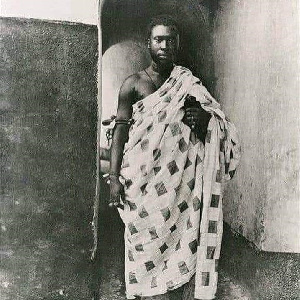Asantehene Prempeh I was in exile in Seychelles for 24 years following his surrender of the Kingdom and his arrest in 1896.
Born Prince Kwaku Dua III in 1870, Prempeh I was the 13th ruler to ascend unto the Golden Stool at the age of 18 and after his ascension onto the throne, he began an active campaign aimed at defending the Ashanti sovereignty.
At the time, the British led by Queen Victoria had offered to take the Kingdom of Ashanti under their protection, but Prempeh I refused to grant their request.
He told the British as quoted in a Ghanaian museum reportage, “my Kingdom of Asante will never commit itself to any such policy of protection; Ashanti people and the Kingdom of Ashanti must remain an independent sovereign state as of old, and at the same time be friends with all white men.”
Offended by the response of Prempeh, the British Governor is reported to have demanded reparations (fines of 50,000 ounces of gold levied on the Asantehene, the Ashanti emperor, by the Treaty of Fomena) – which was agreed by Otumfuo Nana Kofi Karikari in the third Anglo-Ashanti War which occurred from 1873 to 1874 which the Asantes lost to the British for the first time.
Prempeh I, then sent a delegation to London to negotiate the demands with Queen Victoria. The delegates from the Kingdom included its military commander.
The negotiations from the delegation did not yield any result, therefore, the British decided to capture and annex the entire Empire. The war started on the pretext of failure to pay the reparations. Colonel Sir Francis Scott left Cape Coast along with the British and Indian Troops in December 1895 and arrived in Kumasi in January 1896. Major Robert Baden-Powell led an army of African allies who had opposed Ashanti rule.
Prempeh I, who wanted peace, agreed to be captured and exiled to prevent an unprepared war and to protect the Golden Stool.
Prempeh I, the Queen Mother, and other important members of the Asante elite were taken prisoner and marched to the coast. On arrival, they were kept for a year at Elmina Castle but were eventually exiled firstly to Sierra Leone and then later to the Seychelles Islands.
Prempeh I was kept at a suite of apartments in the castle. On his door, however, he had an inscription boldly written “Prempeh Room”.
In a tweet on August 11, The Asante Nation wrote: “the British and their African allies were doing everything possible to break the Asante Kingdom into pieces by exiling our King. Little did the Queen of Britain, Victoria, know that she was fighting a 26-year-old King. Out of embarrassment, they wrote that he was 40 years.”
Prempeh I arrived in Seychelles Islands on Tuesday, September 11, 1900; accompanied by 52 other prisoners, among them were his mother, his father, his brother and his three wives.
He stayed in exile in Seychelles for 24 years before the British allowed him to return to Kumasi as a private citizen.
On September 13, 1924, Prempeh and 49 others were reported to have left Seychelles, SS Karoa for Bombay. The oldest among them was the ex-chief, James Asafu Boachie. He was 96-years-old. The youngest was a three months old baby girl, Rose Amah Apia, daughter of Kojo Apia (1831-1911) ex-chief of Kumasi.
There were also some 13 original deportees, who were with Prempeh. On September 22, 1924, they left Bombay and travelled to Liverpool. The party left Liverpool on October 29, 1924. On Tuesday, November 11, 1924, Prempeh and his delegation arrived in Ghana [Gold Coast] with James Prempeh, his son and his Seychellois wife, Marie-Francoise Auguste. The couple remained in Seychelles.
Prempeh I died on May 12, 1931, and was succeeded by his heir apparent Prempeh II.
Source: www.ghanaweb.com
 Home Of Ghana News Ghana News, Entertainment And More
Home Of Ghana News Ghana News, Entertainment And More





